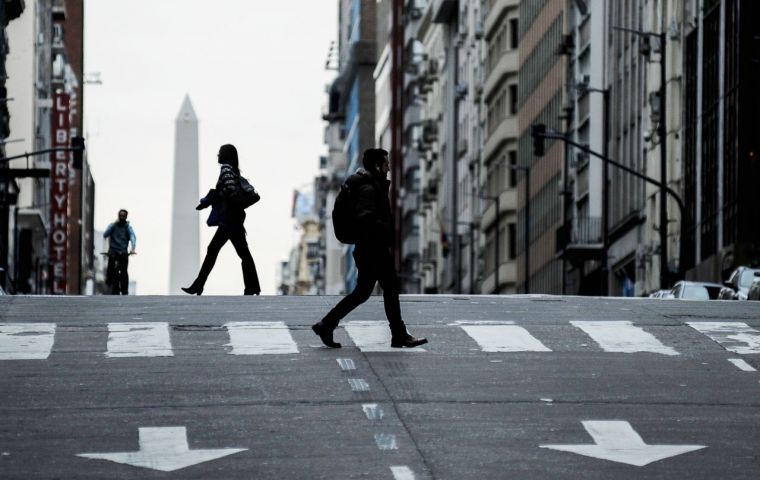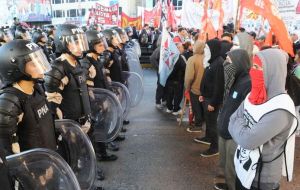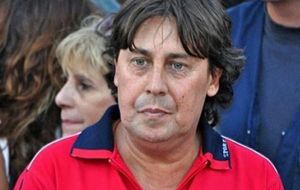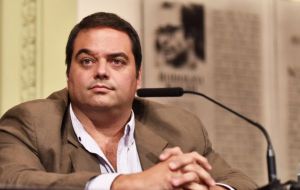MercoPress. South Atlantic News Agency
Massive stoppage in metropolitan Buenos Aires but with limited response in the rest of the country
 In Buenos Aires the strike shut down schools, banks and public transport and demonstrators blocked streets as Macri hosted an international economic forum. (Pic Clarin))
In Buenos Aires the strike shut down schools, banks and public transport and demonstrators blocked streets as Macri hosted an international economic forum. (Pic Clarin))  Police and demonstrators clashed during a rally near one of the roads into Buenos Aires. Judicial sources said five people were injured and six arrested
Police and demonstrators clashed during a rally near one of the roads into Buenos Aires. Judicial sources said five people were injured and six arrested  Pablo Micheli, leader of the Argentina Workers' Headquarters union, estimated participation in Buenos Aires at 90%. “The stoppage is a success”
Pablo Micheli, leader of the Argentina Workers' Headquarters union, estimated participation in Buenos Aires at 90%. “The stoppage is a success”  Triaca echoed Macri's criticism of the unions, accusing them of using the strike to apply political pressure ahead of October elections.
Triaca echoed Macri's criticism of the unions, accusing them of using the strike to apply political pressure ahead of October elections. Airlines in Argentina grounded international flights and riot police scuffled with protesters on Thursday as workers staged a general strike to protest job and pay cuts. Conservative President Mauricio Macri condemned the call to strike where he faces midterm legislative elections in October.
In the capital Buenos Aires the strike shut down schools, banks and public transport and demonstrators blocked streets as Macri hosted international leaders and businesspeople at an economic forum.
The National Civil Aviation Administration said the strike disrupted 800 flights, affecting some 60,000 passengers. Buenos Aires Ezeiza international airport was effectively shut down. Police and demonstrators clashed during a rally near one of the roads into Buenos Aires. Judicial sources said five people were injured and six arrested, lowering an earlier toll of arrests.
Unions and officials said participation in the strike was high, in a country where official data show a third of the people are living in poverty. However government officials admitted the stoppage in Buenos Aires was significant, but in the rest of the country, the response was quite limited.
Pablo Micheli, leader of the Argentina Workers' Headquarters union, estimated participation in Buenos Aires at 90%. “The stoppage is a success,” said Carlos Acuña, leader of the General Labor Confederation, a major union. “It has demonstrated across the country the discontent with the government's economic policies.”
“There is enormous discontent because the economic policy has not yielded results,” said Juan Carlos Schmid, leader of the General Labor Federation, another major union, controlled by the opposition.
Labor Minister Jorge Triaca said there was “a high level of participation” in the stoppage, in metropolitan Buenos Aires because transport did not turn out. But he echoed Macri's criticism of the unions, accusing them of using the strike to apply political pressure ahead of October elections.
The strike coincided with the World Economic Forum on Latin America, which draws business and political leaders to Buenos Aires.
Macri complained during a speech Wednesday that the strike “does not help workers at all,” accusing unions of “mafia-like behavior.” He hardened his line after tens of thousands people demonstrated in his support and democracy on Saturday, in response to several previous mass protests against him.
His vice president, Gabriela Michetti, said the strike was “an extreme measure which will cost the country a billion dollars.”
Macri defended his record at the forum, recalling he had settled a major dispute with foreign debtors and lifted currency controls which distorted the value of the peso.
“It is clear that what started 15 months ago in our country goes much deeper than just economic change,” he said. But the latest opinion polls have turned clearly against Macri for the first time since he took office.




Top Comments
Disclaimer & comment rules-

-

-

Read all commentsArgentine president Mauricio Macri appears to be living in a fantasy world made up by his collaborators and about a third of the population that still supports his income-concentration measures.
Apr 07th, 2017 - 04:38 pm 0By showing inflexibility to soften his stance, Macri forgets he is supposed to be governing for the bulk of Argentines--not for the benefit of a minority as he's currently doing.
Not a good prospect for Argentina's immediate future.
Reekie,
Apr 10th, 2017 - 06:41 pm 0“...the whole country looked like a ghost country.” (in another thread).
For your information, the “whole country” of Argentina is a bit more than just the city of Buenos Aires.
“The rest of the country did not strike”
Apr 11th, 2017 - 05:33 pm 0So you admit that your “...the whole country looked like a ghost country.” was incorrect.
Good. Thank you for the clarification.
Commenting for this story is now closed.
If you have a Facebook account, become a fan and comment on our Facebook Page!